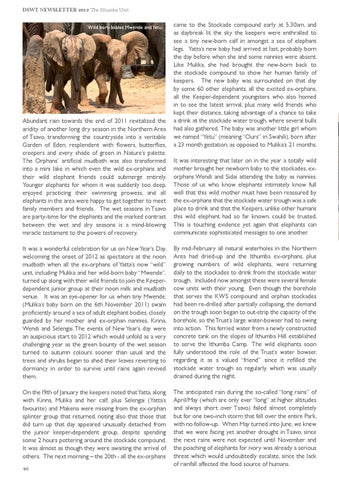DSWT NEWSLETTER 2012 The Ithumba Unit Wild born babies Mwende and Yetu
Abundant rain towards the end of 2011 revitalized the aridity of another long dry season in the Northern Area of Tsavo, transforming the countryside into a veritable Garden of Eden, resplendent with flowers, butterflies, creepers and every shade of green in Nature’s palette. The Orphans’ artificial mudbath was also transformed into a mini lake in which even the wild ex-orphans and their wild elephant friends could submerge entirely. Younger elephants for whom it was suddenly too deep, enjoyed practicing their swimming prowess, and all elephants in the area were happy to get together to meet family members and friends. The wet seasons in Tsavo are party-time for the elephants and the marked contrast between the wet and dry seasons is a mind-blowing miracle testament to the powers of recovery.
came to the Stockade compound early at 5.30am, and as daybreak lit the sky the keepers were enthralled to see a tiny new-born calf in amongst a sea of elephant legs. Yatta’s new baby had arrived at last, probably born the day before when she and some nannies were absent. Like Mulika, she had brought the new-born back to the stockade compound to show her human family of keepers. The new baby was surrounded on that day by some 60 other elephants, all the excited ex-orphans, all the Keeper-dependent youngsters who also homed in to see the latest arrival, plus many wild friends who kept their distance, taking advantage of a chance to take a drink at the stockade water trough, where several bulls had also gathered. The baby was another little girl whom we named “Yetu” (meaning “Ours” in Swahili), born after a 23 month gestation, as opposed to Mulika’s 21 months. It was interesting that later on in the year a totally wild mother brought her newborn baby to the stockades, exorphans Wendi and Sidai attending the baby as nannies. Those of us who know elephants intimately know full well that this wild mother must have been reassured by the ex-orphans that the stockade water trough was a safe place to drink and that the Keepers, unlike other humans this wild elephant had so far known, could be trusted. This is touching evidence yet again that elephants can communicate sophisticated messages to one another.
It was a wonderful celebration for us on New Year’s Day, welcoming the onset of 2012 as spectators at the noon mudbath when all the ex-orphans of Yatta’s now “wild” unit, including Mulika and her wild-born baby “Mwende”, turned up along with their wild friends to join the Keeperdependent junior group at their noon milk and mudbath venue. It was an eye-opener for us when tiny Mwende, (Mulika’s baby born on the 6th November 2011) swam proficiently around a sea of adult elephant bodies, closely guarded by her mother and ex-orphan nannies, Kinna, Wendi and Selengai. The events of New Year’s day were an auspicious start to 2012 which would unfold as a very challenging year as the green bounty of the wet season turned to autumn colours sooner than usual and the trees and shrubs began to shed their leaves reverting to dormancy in order to survive until rains again revived them.
By mid-February all natural waterholes in the Northern Area had dried-up and the Ithumba ex-orphans, plus growing numbers of wild elephants, were returning daily to the stockades to drink from the stockade water trough. Included now amongst these were several female cow units with their young. Even though the borehole that serves the KWS compound and orphan stockades had been re-drilled after partially collapsing, the demand on the trough soon began to out-strip the capacity of the borehole, so the Trust’s large water-bowser had to swing into action. This ferried water from a newly constructed concrete tank on the slopes of Ithumba Hill established to serve the Ithumba Camp. The wild elephants soon fully understood the role of the Trust’s water bowser, regarding it as a valued “friend” since it refilled the stockade water trough so regularly, which was usually drained during the night.
On the l9th of January the keepers noted that Yatta, along with Kinna, Mulika and her calf, plus Selengai (Yatta’s favourite) and Makena were missing from the ex-orphan splinter group that returned, noting also that those that did turn up that day appeared unusually detached from the junior keeper-dependent group, despite spending some 2 hours pottering around the stockade compound. It was almost as though they were awaiting the arrival of others. The next morning – the 20th - all the ex-orphans
The anticipated rain during the so-called “long rains” of April/May (which are only ever “long” at higher altitudes and always short over Tsavo) failed almost completely but for one two-inch storm that fell over the entire Park, with no follow-up. When May turned into June, we knew that we were facing yet another drought in Tsavo, since the next rains were not expected until November and the poaching of elephants for ivory was already a serious threat which would undoubtedly escalate, since the lack of rainfall affected the food source of humans.
46
